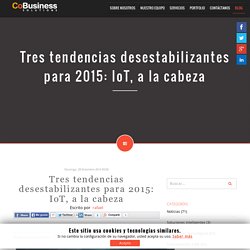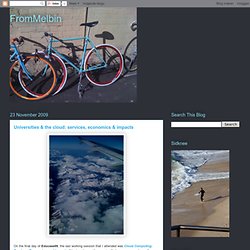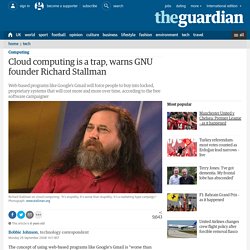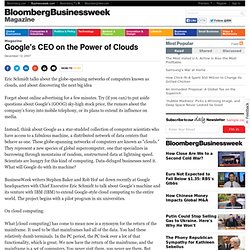

Bureo sur Twitter : "#CloudComputing - Faire travailler ensemble des « sans bureau fixe » Faire travailler ensemble des « sans bureau fixe », Les entreprises face au défi du tout-numérique. Partage des data, téléprésence, cybersécurité… Les outils collaboratifs permettent de fédérer des équipes nomades et dispersées.

Internationalisation des équipes, mutualisation des postes de travail, utilisation d'outils nomades… Les organisations doivent composer avec des « sans bureau fixe » de plus en plus nombreux. Rafael Padura sur Twitter : "Tres tendencias desestabilizantes para 2015: #IoT, a la cabeza #BigData #SDDC #cloudcomputing. Tres tendencias desestabilizantes para 2015: IoT, a la cabeza. El Internet de las Cosas (IoT), los big data y todo definido por software dominaron las noticias IT durante el presente año.

Conforme vemos hacia el 2015, anticipo que la industria IT se sustentará en estas tendencias, incrementando la innovación en las diferentes industrias y obligando a compañías establecidas a competir con nuevas empresas en surgimiento. En 2015, nuevas iteraciones de estas tecnologías desestabilizadoras serán decididamente diferentes de las que hemos visto en el pasado, pero todas se inclinarán hacia la misma meta: servir a la empresa y al usuario final. Internet de las Cosas que importan Si 2014 fue el año en el que hablamos del Internet de las Cosas, el que viene será el año en que experimentaremos el “Internet de las Cosas que Importan”. Cuando los datos crudos se combinan con analítica avanzada e IT, cosas importantes son posibles (y no sólo para los negocios, sino también para la sociedad en general). Más datos, más motores. Infoesfera: donde la filosofía se encuentra con la tecnología. Algo realmente importante le está ocurriendo a lo que somos y a cómo nos relacionamos, así como al ambiente que habitamos.

Universities & the cloud: services, economics & impacts. On the final day of Educase09, the last working session that I attended was Cloud Computing: Services, Economics, and Impacts.

I'd missed an earlier session that was very popular on the same subject due to conflicting interests and as the last session on the topic, the session was so full that it was standing room only. I didn't have enough space to pull out my laptop, so took some very rough notes on my iPhone. (Apologies if they don't provide a complete picture of the session.) I found it very enlightening and objective on the subject and the considerations surrounding this issue. The discussion centred on a range of questions given to the panel of experts (mostly CIOs - see the link above for full details). Busting Cloud Computing Myths.
Grid4biz. Getting enveloped by the potential of Cloud computing. The orgy of present unwrapping at the end of last year feels a surprisingly long time ago, so it is with some enthusiasm that I await the arrival of my latest bundle from Amazon. Nestled alongside the new offerings from Seth Godin and Garr Reynolds, I look forward to lifting Nick Carr's latest much-trailed tome which the book's own website describes thus; “The shift [to utility computing] is already remaking the computer industry, bringing new competitors like Google and Salesforce.com to the fore and threatening stalwarts like Microsoft and Dell. But the effects will reach much further. Cheap, utility-supplied computing will ultimately change society as profoundly as cheap electricity did. We can already see the early effects — in the shift of control over media from institutions to individuals, in debates over the value of privacy, in the export of the jobs of knowledge workers, even in the growing concentration of wealth.
Indeed. Open Source and Cloud Computing - O'Reilly Radar. I’ve been worried for some years that the open source movement might fall prey to the problem that Kim Stanley Robinson so incisively captured in Green Mars: “History is a wave that moves through time slightly faster than we do.” Innovators are left behind, as the world they’ve changed picks up on their ideas, runs with them, and takes them in unexpected directions.
In essays like The Open Source Paradigm Shift and What is Web 2.0? , I argued that the success of the internet as a non-proprietary platform built largely on commodity open source software could lead to a new kind of proprietary lock-in in the cloud. What good are free and open source licenses, all based on the act of software distribution, when software is no longer distributed but merely performed on the global network stage? Cloud computing is a trap, warns GNU founder. The concept of using web-based programs like Google's Gmail is "worse than stupidity", according to a leading advocate of free software.

Cloud computing – where IT power is delivered over the internet as you need it, rather than drawn from a desktop computer – has gained currency in recent years. Large internet and technology companies including Google, Microsoft and Amazon are pushing forward their plans to deliver information and software over the net. But Richard Stallman, founder of the Free Software Foundation and creator of the computer operating system GNU, said that cloud computing was simply a trap aimed at forcing more people to buy into locked, proprietary systems that would cost them more and more over time.
Google's CEO on the Power of Clouds. Eric Schmidt talks about the globe-spanning networks of computers known as clouds, and about discovering the next big idea Forget about online advertising for a few minutes.

Try (if you can) to put aside questions about Google's (GOOG) sky-high stock price, the rumors about the company's foray into mobile telephony, or its plans to extend its influence on media. Instead, think about Google as a star-studded collection of computer scientists who have access to a fabulous machine, a distributed network of data centers that behave as one.